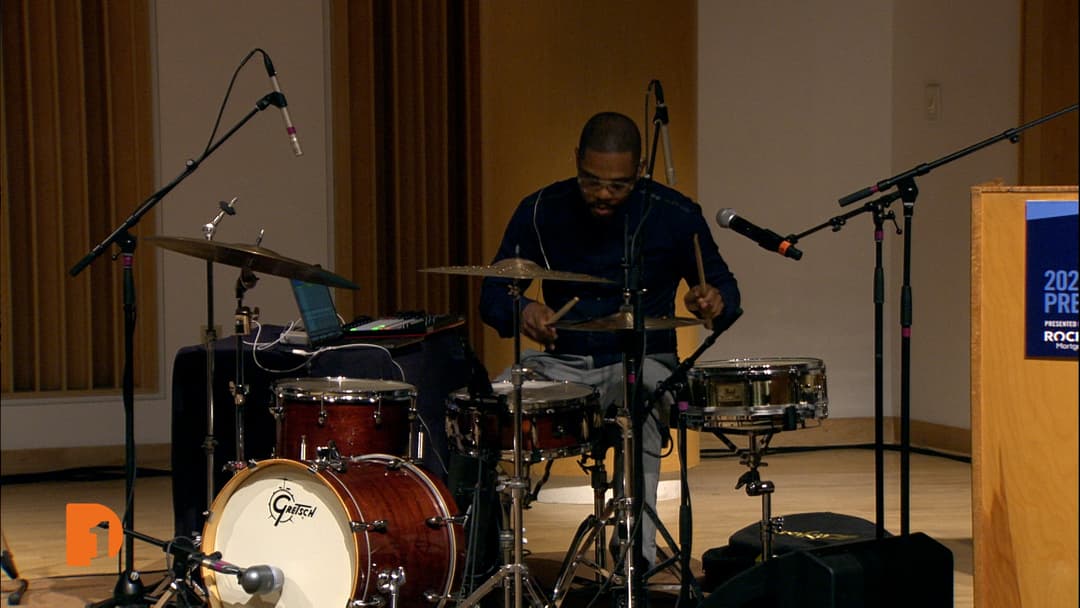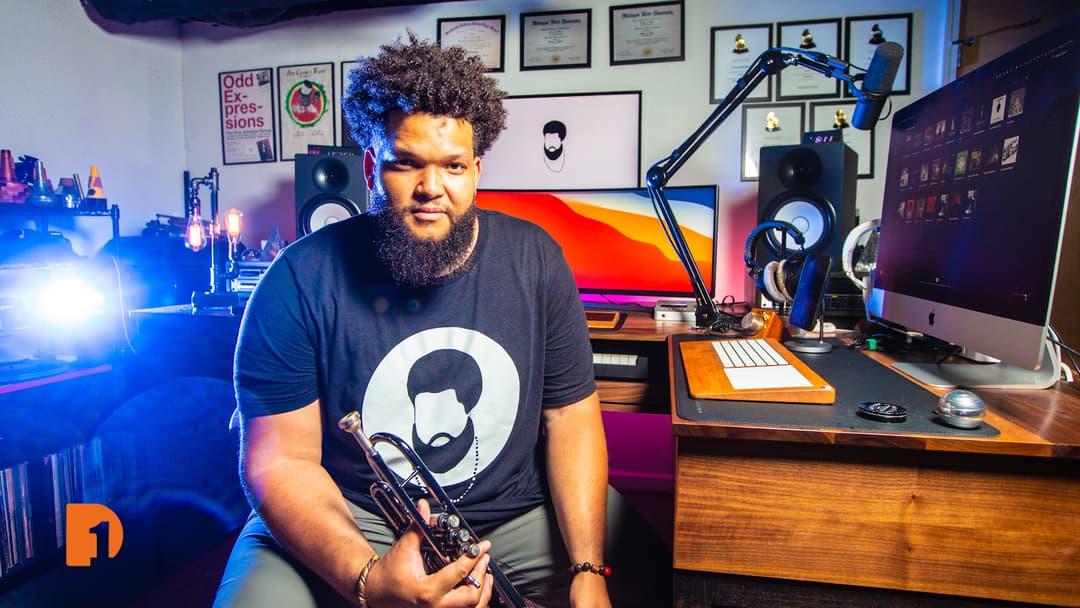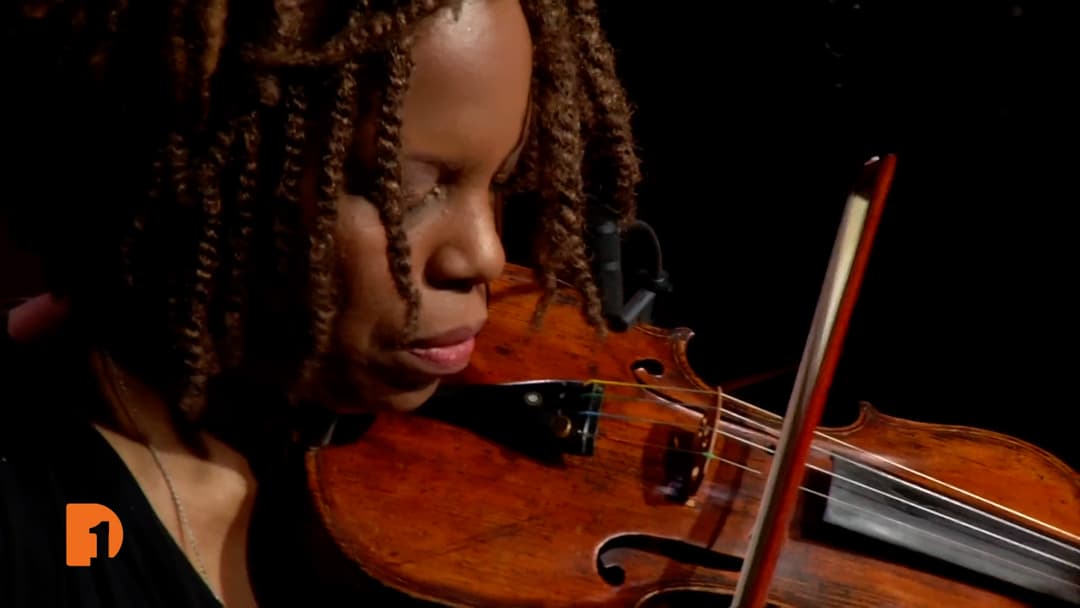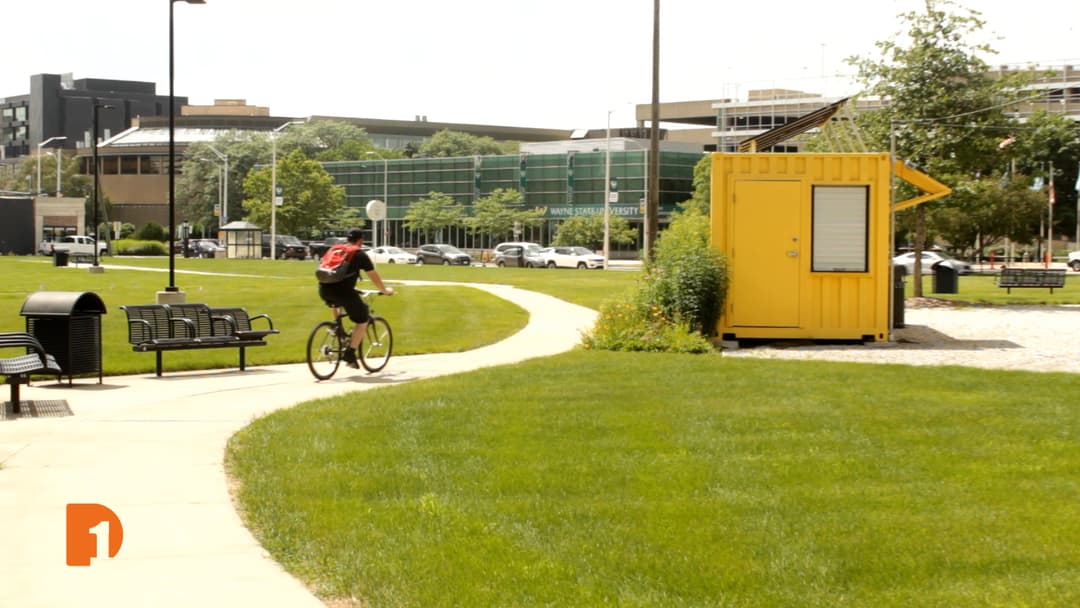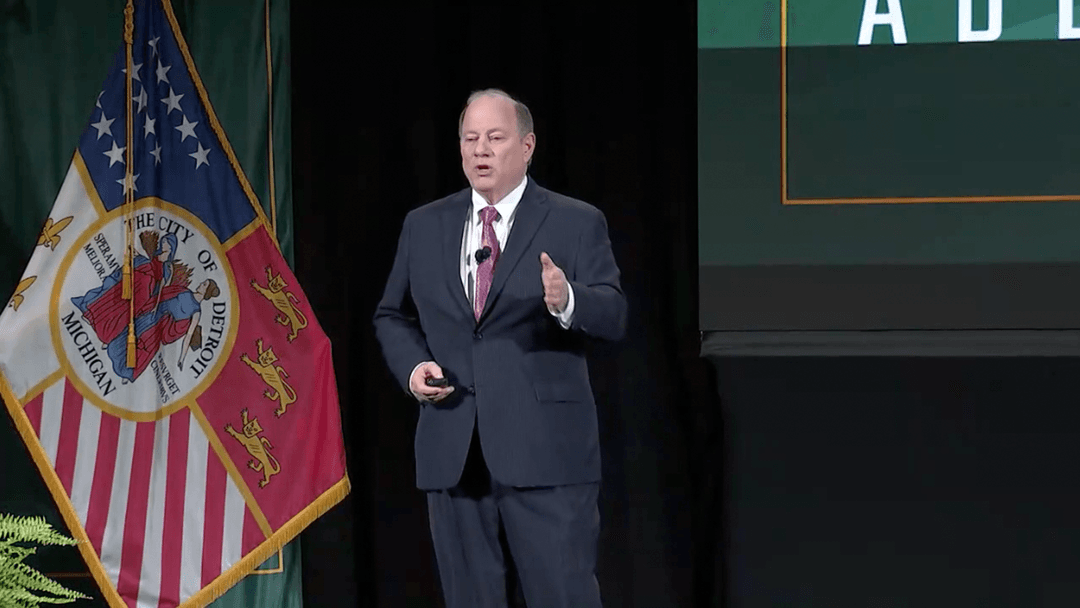Karriem Riggins announced as Detroit Jazz Festival artist-in-residence with lineup of local jazz masters
Apr 14, 2023
The Detroit Jazz Festival Foundation has announced its lineup for the annual Labor Day weekend festival in downtown Detroit. Headlining the festival will be three Detroit jazz legends, violinist Regina Carter, saxophonist Kenny Garrett and drummer Louis Hayes, all of whom recently received a National Endowment for the Arts Jazz Master Award.
RELATED: Detroit-born violinist Regina Carter receives 2023 NEA Jazz Master Award
The festival also introduced the Detroit-native jazz drummer and hip-hop producer Karriem Riggins as this year’s artist-in-residence. The renowned drummer will spend the summer participating in educational and community activities as part of his residency, leading up to his performance at the 2023 Detroit Jazz Festival.
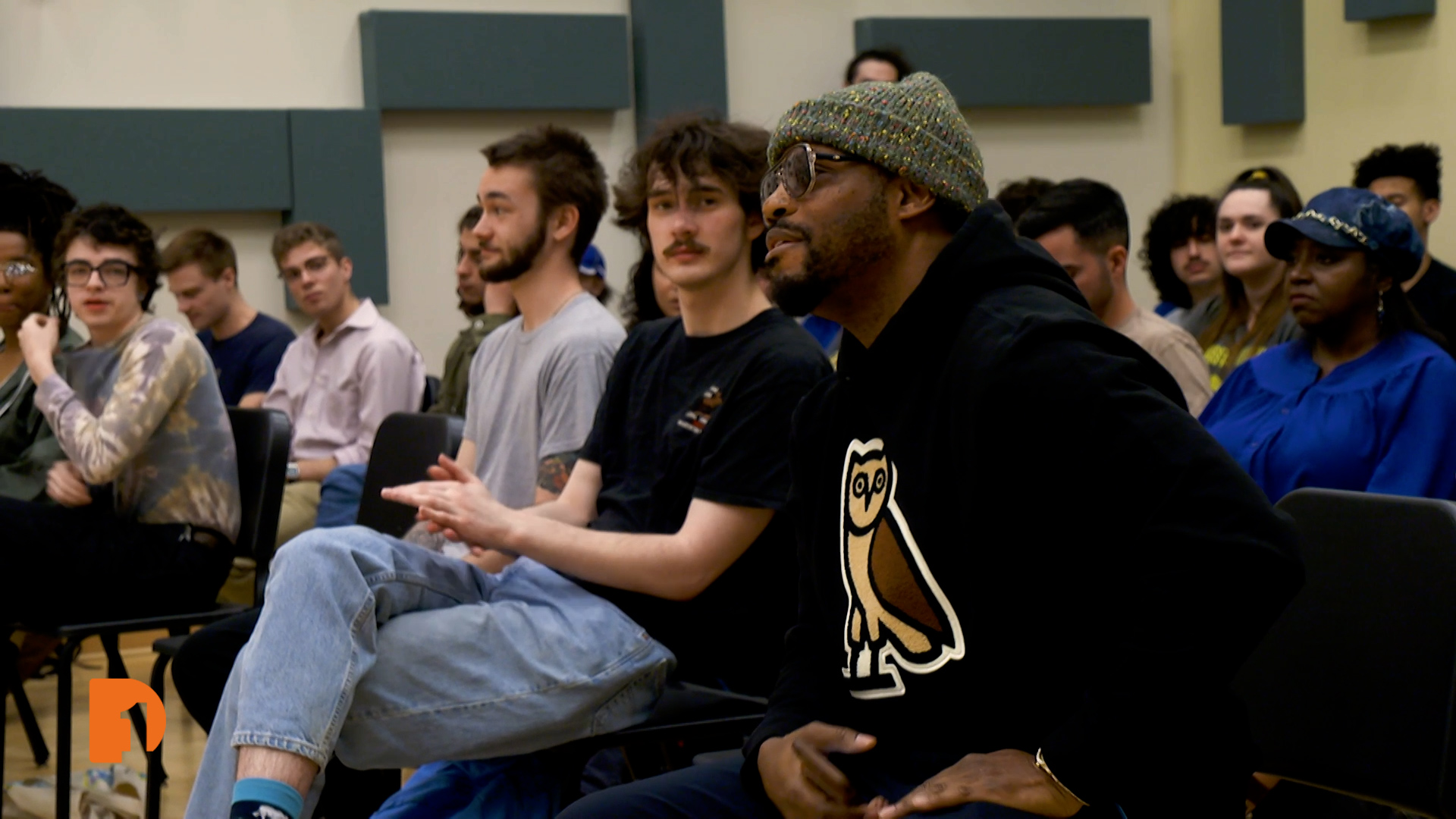
Riggins sat down with 90.9 WRCJ’s John Penney, the host of JazzFest Detroit, after hosting a master class for Wayne State University music students to talk about what it means to be introduced as the artist-in-residence for his hometown jazz festival and what he’s preparing for the Labor Day weekend performance.
Plus, they talk about jazz gatekeepers and how Riggins has blended his love for multiple genres into a unique sound of his own; how today’s jazz students are evolving the genre; the mentor that pushed him to find his voice in the music; and what he hopes to achieve as a prolific musician. Riggin’s performance from the Detroit Jazz Festival Preview Event can be seen below.
Watch the full Detroit Jazz Festival Preview event to hear the lineup announcement and Riggins’ full performance.
Full Transcript:
Karriem Riggins, 2023 Detroit Jazz Festival Artist-in-Residence: Great job, Melody. Great job. One thing I will say about this is, I learned from playing with Ray Brown, when you don’t know it, when in doubt, lay out. Like, if you don’t know the changes, just lay out. If the roots just play the roots until it can gel, you know what I’m saying?
John Penney, 90.9 WRCJ: Karriem, I’m just so thrilled that you’re here. Welcome home.
Karriem Riggins: Thank you.
John Penney: And I’m really excited that you’re sitting in this chair this year for the Detroit Jazz Festival. What is your earliest recollection of the jazz festival?
Karriem Riggins: I would frequently come to the festival every year. My dad had some kind of show. So, I just remember as early as maybe seven, eight years old, I got a chance to just run from stage to stage to kind of peek in on what was going on.
John Penney: Jazz, if you’re going to talk about a genre, I think is the broadest and most inclusive tent because it’s always evolving. And think a lot of that evolution follows technology. I’m curious, how are you going to put all this together? What are your thoughts for the festival this year?
Karriem Riggins: Well, one thing I want to speak on is talking about the jazz people, jazz police. I really can care less about what people think is jazz or not because it’s what comes from here. And sometimes what comes from here, you can’t put a label on. It’s Something from the heart. So, that is something that was just instilled in me from the beginning, is having my background and roots in hip-hop. And I grew up listening to jazz. So all these different genres, I feel like you– the more you read, the more articulate you are in expressing yourself.
And I feel like listening to music is the same thing. And the more you listen to different things, you can bridge those gaps and it becomes one thing. But for me, I feel like integrating all these different instruments, they’re going to– it’s my voice, you know, loops, finding different loops, it’s a starting point. And sometimes we arrive at a different place from it just being a loop. That’s where everything is kind of in a melting pot together and it’s like a gumbo soup that you make. And there’s so many different elements in there that make it special.
John Penney: I found it really interesting in one interview you were talking about how with Common working on his record, it was all beats that take a lot to put together. But then, with August Greene, which is you, Common, and Robert Glasper, you were playing all that live. There was that kind of interaction back and forth. Who are you going to be bringing to the festival?
Karriem Riggins: It’s going to be quite a surprise.
John Penney: Oh, you aren’t going to tell us?
Karriem Riggins: I don’t really have anything to say now at this point. But I will say that it will be some of the people that I’ve been collaborating with over the years.
John Penney: I would be surprised if August Greene doesn’t make it. Let’s put it that way.
Karriem Riggins: I want to definitely do something that I haven’t done before, and that takes a little more effort and work. So, that’s what I want to bring to the city, something special. And it’s not just the city because there’s millions of people who get to watch this festival. And I just want to make such a big, huge statement.
Karriem Riggins: Much better. I feel like just that little space makes a big difference.
John Penney: How do you feel? You were working with kids today here. How are they evolving and how do you think the music is evolving for that generation?
Karriem Riggins: Well, I could just hear, you know, it’s becoming more of a thing now because people listen to so much a different kind of music. Spotify and Tidal and all these digital streaming platforms have so much, you could just jump from here. You can listen to Maurice Ravel and you can go to Phineas Newborn, and then you can go to a Kaytranada, or Madlib, or myself. And I feel like you can hear those influences and the youth playing now.
John Penney: You went out with Betty Carter when you were 17. What did you learn playing with Betty and what was it like?
Karriem Riggins: Well, what I did with Betty Carter was a Jazz Ahead where she flew out, I think it was like five musicians from Detroit and I think like seven other cities, she had a lot of musicians came in and we all wrote music and we all had to interpret each other’s music. And I think that she was looking for us to play and be original and not be cliche. So, if she heard us or seen anything that was cliché, she would like, No, do your thing. And I feel like that kind of pushed me to be original and not to follow any kind of cliches, no copying.
Playing that last tune when you went into those fields, you should definitely zone in on those fields and play you, be you throughout all of that. Yeah, the first tune. Yeah. Yeah. Throughout the setting of those fields, it’s specific setting up certain fields. But I know you can do it in your own way where you’re speaking in your voice.
John Penney: That’s hard to do. I mean, if you’re just playing with the notes and the scale, but the way you can express them with all the different sounds and combinations of sounds.
Karriem Riggins: I think now it’s a lot easier creatively to see the sound wave on the screen. You can find the downbeat because it’s a big bubble and you say, Oh, that’s something there. Instead of using numbers. I think back when the NPC 3000 was around, using those numbers will kind of take up the space of you and the flow of being creative. So I feel like there’s more room for creativity now because your workflow is faster. It’s all about getting the idea out and being prolific and moving on to the next. And that’s what I really want to achieve, just being prolific and creating as much as I can while I’m here on this earth.
John Penney: You’re my favorite kind of drummer. I mean, it’s like the right lick in the right place. I mean, I love Art Blakey, but he’s out front. You’ve been described as skeletal, and I think that’s a positive thing. I mean, it’s the bone against which all the flesh can be grown.
Karriem Riggins: That’s what I strive to achieve through practicing and just trying to find that right thing to play to make people feel. The drummer is supposed to make you dance and feel something, and that is what I want to achieve every time I play. I think I just learned just from being around great musicians that less is more. The simplicity in it speaks more. You say more by leaving room, leaving space, and just playing the groove. I’ve worked so much, I think, by just being simple and playing the groove.
Stay Connected:
Subscribe to One Detroit’s YouTube Channel & Don’t miss One Detroit Mondays and Thursdays at 7:30 p.m. on Detroit PBS, WTVS-Channel 56.
Catch the daily conversations on our website, Facebook, Twitter @DPTVOneDetroit, and Instagram @One.Detroit
View Past Episodes >
Watch One Detroit every Monday and Thursday at 7:30 p.m. ET on Detroit Public TV on Detroit Public TV, WTVS-Channel 56.
Stay Connected
Subscribe to One Detroit’s YouTube Channel and don’t miss One Detroit on Thursdays at 7:30 p.m. and Sundays at 9 a.m. on Detroit PBS, WTVS-Channel 56.
Catch the daily conversations on our website, Facebook, Twitter @OneDetroit_PBS, and Instagram @One.Detroit
Related Posts
Leave a Reply
Your email address will not be published. Required fields are marked*







